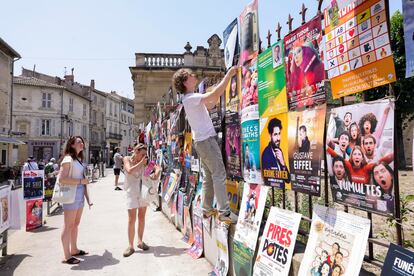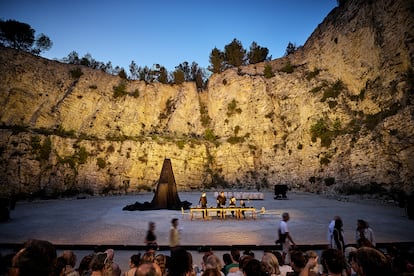The tragedy of Hecuba had just occurred when the creator of the show and also director of the Avignon festival, the Portuguese Tiago Rodrigues, entered the scene with a microphone in his hand. It was midnight on Sunday 30 July, the victory of Marine Le Pen’s party in the first round of the French legislative elections had been confirmed and Rodrigues announced: “The historical responsibility of the Avignon festival obliges it to counteract the supposed inevitability of a far-right government in France by calling for a referendum.” A night of resistance and debate during the early hours of July 4-5”. The words echoed loudly off the ancient stones of the Boulbon quarry, the same stage where Peter Brook premiered his legendary work in full. Mahabharata, from seven in the evening on 13 July 1985 until seven in the morning on 14 July, the anniversary of the storming of the Bastille that began the French Revolution. The audience burst into applause when Rodrigues recalled the founding values of the event: “This is a popular, democratic, republican, progressive, anti-racist, feminist and ecological festival.”
The call for entries did not come as a surprise to anyone. Nor was it surprising that a festival supported by public funds of all stripes and considered by the French to be one of the jewels of their culture took such a clear political stance. Not in vain is it the most important contemporary theatre event in Europe. In the Spanish context, Rodrigues’s head might already be rolling, but the Avignon festival is untouchable precisely because it represents the values on which the national idiosyncrasy is based. For this very reason it has always been a social and political resonance box. With its foundation in 1947, Jean Vilar undertook the cultural reconstruction of the country after the Second World War and throughout its history it has experienced turbulent times such as the strike of the intermittent workers of the show business that paralyzed it in 2003. In March 2014, in the middle of the campaign for the municipal elections, the then director of the festival, Olivier Py, assured that if the extreme right won in the city he would move it to another location. It didn’t happen then, but another protest by the intermittents forced the inauguration to be suspended that year.
Ten years later, “the possibility of the far right taking power in France is no longer a theory, but a real threat,” as Rodrigues recalled on stage on Sunday. The festival had started the day before with a day of reflection in the air and a gathering of entertainment workers in front of the Palais des Papes, the main stage of the show, to express their rejection of discrimination, racism and social regression. Since then, small demonstrations have taken place in the streets under the slogan of solidarity and it is likely that the mobilization will intensify during the week in view of the second round on Sunday.
The highlight will be the “night of resistance”, officially convened by the festival in the early hours of Thursday to Friday. It will take place at the Palais des Papes, once the performance of Damon. Bergman’s funeral, The event was opened on Saturday by Spanish writer Angélica Liddell, who inaugurated an edition in which the Spanish language is the guest of honour. Not only artists and figures from French culture and civil society have confirmed their active participation, from actress Jeanne Balibar to rapper and actor Joey Starr, but also many of the foreign creators who are meeting there these days. When French culture trembles in Avignon, the echo resonates far beyond. Even more so if it could mean cuts in a system of cultural management and production that has been a model for many countries, including Spain.

Teresa Suarez (EFE)
Rodrigues was emphatic in his statements: “The current management of the festival will never accept collaborating with a government and a Ministry of Culture controlled by the extreme right. Freedom of expression, which has been the banner of this festival since its foundation, is in danger.” The Portuguese director, who has only been in office for two editions and is the first foreigner to do so, embodies the spirit of Avignon like few others. Not only in his convictions, but also in his artistic commitments. The show that premiered on Sunday at the Boulbon quarry, Hecuba, not Hecuba, The play is a moving and poetic interweaving of the tragedy of the Queen of Troy as told by Euripides with that of a woman of our time. The former tore out the eyes of her son’s murderer, King Polymestor, the very person to whom she had entrusted her protection from the Greeks. Today’s play is a mother who demands justice for her autistic son, mistreated in the centre where he was supposed to receive assistance and care. Masterfully performed by actors from the Comédie-Française, the play has moved people in Avignon because of the symbolic charge it takes on at a time when the protection of the most vulnerable people is in danger. The production will be performed at the Teatros del Canal in Madrid next January.
The premiere of the film also caused excitement on Monday. Tear, Another of the most anticipated shows of this edition, written and directed by the French Caroline Guiela Nguyen, revered in Avignon since she presented Saigon in 2017. It is the story of the making of the wedding dress of a fictional English princess, in which a prestigious Parisian haute couture house, an embroidery workshop from Bombay and the last women who have mastered the technique of Alençon needle lace, listed by UNESCO as a World Cultural Heritage, take part. The work interweaves the circumstances of all these workers – work, family, emotional – and offers a fresco of how the global production system impacts people’s lives. The Spanish National Dramatic Centre is participating in the co-production of this production and will exhibit it at the María Guerrero theatre in Madrid from March 28 to 30, 2025.

However, not everything is political upheaval in Avignon. The festival has traditionally been the scene of great artistic innovations, scandals and battles. The first of this edition was sparked on the opening day by the Spanish actress Angélica Liddell, who attacked several French critics by name during her show. The next day, one of them denounced her for libel and asked the event management to remove the scene. Rodrigues once again reminded: “Since its origins, the festival has defended freedom of creation, freedom of expression and freedom of the press.”
All the culture that goes with you awaits you here.
Subscribe
Babelia
The latest literary releases analysed by the best critics in our weekly newsletter
RECEIVE IT
Subscribe to continue reading
Read without limits
_
#Avignon #festival #enters #fight